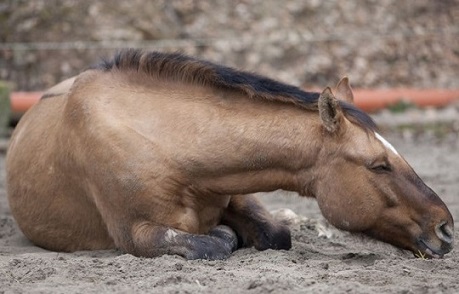BREAKING Medical News! First Human Case Of Western Equine Encephalitis In 20 Years Reported In Argentina As Hundreds Of Horses Dying Across The Country!
Nikhil Prasad Fact checked by:Thailand Medical News Team Dec 22, 2023 1 year, 3 months, 3 weeks, 6 days, 3 hours, 8 minutes ago
Medical News: In a staggering turn of events, Argentina finds itself grappling with a public health crisis as the nation reports the first human case of Western Equine Encephalitis (WEE) in more than two decades. This shocking revelation comes amidst a nationwide outbreak that has already claimed hundreds of equine lives, prompting health authorities to declare a state of emergency.

The Ministry of Health of the Nation has confirmed the positive results in a patient residing in the province of Santa Fe, a region where cases in horses have been previously documented. This
Medical News report seeks to delve deeper into the various facets of this unprecedented occurrence, covering the diagnosis, symptoms, impact on the equine population, urgent measures being implemented, and the global significance of the situation.
Historical Context: The Rarity of Human Cases and the Need for Vigilance
The last recorded instances of human WEE cases in Argentina date back to 1983 and 1996, making the recent diagnosis a rare and concerning occurrence. The Ministry of Health's issued Epidemiological Alert on November 28 marked the initiation of human surveillance following the identification of cases in horses. This historical context emphasizes the need for heightened vigilance and a comprehensive understanding of the evolving situation.
Equine Outbreak: A Devastating Toll on Horses
The impact of the outbreak on the equine population has been profound, with a staggering 920 confirmed cases reported by the National Service of Animal Health and Agrifood Quality (Senasa) across 15 provinces in Argentina. The virus, known since 1930, was previously managed through mandatory equine vaccinations, a practice that was discontinued a few years ago, leading to a current shortage of vaccines. The shortage, coupled with the resurgence of local production and imports, is projected to cover only 40% to 50% of Argentina's estimated 2.5 to 3.5 million horses.
State of Emergency: Swift Measures Implemented
In response to the escalating crisis, Argentina's National Service of Animal Health and Agrifood Quality (Senasa) recently declared a state of health emergency throughout the national territory.
https://www.batimes.com.ar/news/argentina/argentina-declares-health-emergency-due-to-outbreak-of-equine-virus.phtml
The declaration comes as a response to the alarming spread of equine encephalitis, encompassing Eastern equine encephalitis (EEE), western equine encephalitis (WEE), and Venezuelan equine encephalitis (VEE). A total of 426 positive outbreaks have been confirmed, with 13 by laboratory diagnosis and 413 by clinical diagnosis based on symptoms and epidemiological link. The outbreak is not contained within Argentina's borders, having spread into neighboring Uruguay.
Geographical Spread: Eight Provinces Affected
The geographical spread of the outbreak is evident, with confirmed cases documented in eig
ht out of Argentina's 24 provinces. These provinces include Buenos Aires, Chaco, Corrientes, Córdoba, Santa Fe, Entre Ríos, Formosa, and Santiago del Estero. The urgency of the situation has prompted immediate containment measures, restrictions on movements, and specific measures targeting concentrations of horses.
Urgent Health Measures: Combating the Outbreak
As part of the urgent health measures, mosquito control efforts are deemed essential to prevent the further spread of the disease to horses and humans. Health authorities emphasize the application of products authorized by Senasa to animals and their environment. Additionally, the vaccination of horses against WEE is a critical component of the response. Senasa is coordinating with Veterinary Product chambers to ensure the availability and distribution of a substantial number of vaccines in the shortest time possible.
Vaccine Arrival: A Ray of Hope Amidst the Crisis
In a significant development, Senasa confirmed the arrival of 300,000 doses of equine encephalitis vaccine, covering both Eastern and Western variants. While this is a crucial step in curbing the outbreak, the distribution priority is given to districts with the highest number of positive notifications and areas with favorable ecological conditions for the virus. Vaccination efforts must be carried out by licensed veterinarians, with a recommended booster dose for first-time recipients.
Human Case Confirmed: The Unprecedented Development
The confirmation of the first human case of WEE in Reconquista, Santa Fe province, adds a new and concerning dimension to the crisis. The patient, diagnosed from samples sent by the "Olga Stucky de Rizzi" Hospital, is currently hospitalized and recovering favorably. The rarity of human cases, with the last instances recorded in 1983 and 1996, highlights the unpredictable nature of the virus and the challenges it poses in terms of human health.
Symptoms and Incubation Period in Humans: Understanding the Risks
In humans, WEE manifests with an incubation period of 2 to 10 days. While most cases are asymptomatic or present with mild symptoms such as fever, fatigue, muscle pain, and general malaise, recovery generally occurs within 7 to 10 days. However, the absence of effective vaccines for humans raises concerns about the potential for severe health complications and also fatal outcomes.
Global Significance: WHO Recognizes WEE as an International Public Health Threat
The World Health Organization (WHO) recognizes WEE as an "international public health threat" due to its high potential to cross borders. The disease, transmitted through the bite of infected mosquitoes, not only poses a risk to horses but also raises broader public health concerns. The interconnected nature of global health emphasizes the need for collaborative efforts in addressing emerging threats.
Conclusion: Navigating Uncharted Territory
In conclusion, Argentina finds itself navigating uncharted territory with the resurgence of Western Equine Encephalitis. The first human case in over two decades amplifies the complexity of the crisis. Urgent measures, including vaccination campaigns, mosquito control, and heightened surveillance, are imperative to mitigate the impact. As the global community observes, the situation underscores the critical importance of proactive and coordinated responses in the face of emerging health threats, reinforcing the need for continued research, vigilance, and international collaboration in safeguarding public health.
For the latest
Medical News, keep on logging to Thailand Medical News.
